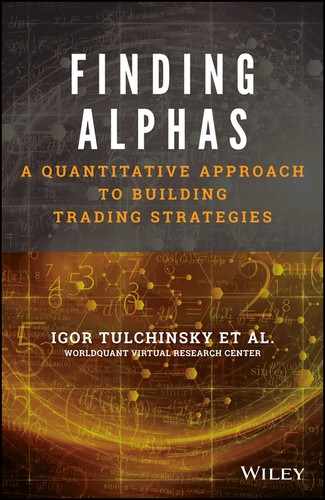21
Introduction to Momentum Alphas
By Zhiyu Ma
Momentum alphas are an important group and a broad category of alphas. Here we define momentum alphas as average alpha values (the forecasted neutralized stock returns) that share the same signals with a period of past returns (of its own or some other stocks).
In 1993, Jegadeesh and Titman published the first paper on stock price momentum, “Returns to Buying Winners and Selling Losers: Implications for Stock Market Efficiency,” which stated that the winners/losers in the past 3 ~ 12 months are likely to continue to win/lose in the future. Later, many other researchers studied the same phenomenon and confirmed that it works in most stock markets and other financial markets around the world. In recent years, the profit of this alpha has shrunk a lot, and it suffered a large drawdown during the financial crisis of 2008. Then a lot of papers tried to modify the simple rule to enhance the potential profit and reduce the drawdown while keeping the spirit of the alpha. It is still an active field of research within the academic community.
Researchers try to give reasonable explanations as to why momentum alphas work. A well-accepted theory is investors’ underreaction to new information. In an imperfectly efficient market, it takes time to resolve and price the new information, as the stock prices gradually reach the target. This holds water when we investigate the impact of events on the markets. There is stock price momentum when public information is announced (e.g. earnings announcements); the more powerful the information, the stronger the momentum effect. An interesting observation is that stock momentum actually starts before the announcement is made (i.e. when the public information was private information).
Not only do investors underreact to the new information, but stock analysts do also. Under peer pressure, the analysts are reluctant to make outstanding (but incorrect) forecasts; instead they tend to gradually adjust their forecasts on future earnings and target prices. So when investors in the market make investment decisions based on analysts’ recommendations, the overall decision itself is an underreaction, which explains price momentum effect in another way.
Factor momentum is another type of momentum. In arbitrage pricing theory, we can explain thousands of stock returns by a much smaller set of factors. Stock factor exposure always changes. Yet, when it is compared with a single stock, single factor returns are much more stable (at least over a period of time or market state). Alphas that are based on factor regressions all assume that the factors’ returns have momentum effect. Another application of factor momentum is to trade the hot factors that the current market favors by reverse engineering what mutual fund managers are investing.
Another type of momentum is group momentum, which is often related to a phenomenon called co-movement. Related stocks (stocks that are business related, or share similar exposure of a factor that explains returns significantly) tend to move together. When we say they move together, it doesn’t mean they move exactly the same amount at the same time. Usually there are a few leaders in the group that move first (possibly driven by new information), and then other stocks within the same group will follow the leaders. This is called lead–lag effect. The lagged stocks enjoy the momentum profits. Besides related stocks, there are also related groups (for example, industries on the supply chain) that transfer one group’s return to others.
As mentioned, the first paper discussing momentum does not mention the word “momentum,” but mentions “market efficiency.” Indeed, momentum effects are related with inefficiency. Developing momentum alphas on liquid universes (which are sets of more efficient stocks) is a challenge, and it requires us to explore the field in a deeper way to find the working alphas.
